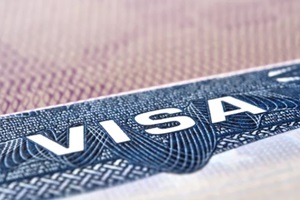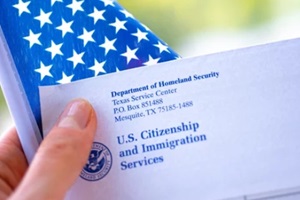The adjustment of status process enables particular immigrants in the U.S. to obtain permanent residency without leaving the country.
However, the intricate application risks denials and delays without expert legal guidance. An experienced immigration attorney can help you navigate eligibility, paperwork, and long processing times to improve the chances of getting approval.
Understanding the Adjustment of Status Process
 If you are already present in the United States and fulfill the eligibility criteria, you can obtain permanent residency without having to leave the country through adjustment of status.
If you are already present in the United States and fulfill the eligibility criteria, you can obtain permanent residency without having to leave the country through adjustment of status.
You can, therefore, obtain a green card while remaining in the U.S. and avoid the delays and inconvenience associated with consular processing abroad.
You may be eligible to apply for adjustment of status based on familial relationships, employment offers, refugee/asylee status, or other special circumstances.
The eligibility criteria depend on the specific immigrant category you are petitioning under.
Generally, the adjustment of status process involves:
- Determining Eligibility: The first step is confirming if you qualify for adjustment of status under one of the approved immigrant categories. Factors like your current immigration status, manner of entry into the U.S., and immigrant intent play a role.
- Filing Immigrant Petition: Most categories require you or a sponsor to file an I-130 immigrant petition on your behalf, though some allow for concurrent I-485 adjustment filing.
- Checking Visa Availability: With a few exceptions, you must have an approved I-130 and available visa before filing I-485.
- Submitting I-485 Application: This comprehensive application collects your biodata, immigration details, documents, fees, and more.
- Biometrics Appointment: You must appear at an Application Support Center to submit your fingerprints, photos, and signature to prove your identity.
- Interview: Many adjustment applicants are called for an in-person interview by USCIS adjudicators before deciding on their case.
- Decision: USCIS decides on approving or denying you permanent resident status based on documents, background checks, eligibility, and administrator discretion.
Getting through these steps smoothly takes expertise in immigration law, regulations, and procedures. Adjustment of status carries risks like denial or delays, which can be best mitigated by the experience an immigration attorney brings to the table.
Challenges in the Adjustment of Status Timeline
Despite your best efforts, the adjustment of status process often suffers delays ranging from a few months to several years. Some of the primary factors that cause these delays include:
Processing Delays
Excessive processing times and backlogs within the USCIS are an unfortunate reality. Increased workload coupled with limited personnel causes petitions and applications to remain pending for longer than the targeted timeframes.
Employment-based AOS applicants face some of the longest waits, crossing 24+ months in some visa categories, before getting interim benefits. Family-based applicants also encounter similar struggles.
Such delays can hamper your personal and professional plans, particularly if you wish to change jobs, travel abroad, or become a permanent resident.
Working with an experienced legal team can help you track your case status and overcome barriers more efficiently.
Documentation Issues
The AOS process requires you to furnish extensive paperwork covering identity, immigration history, eligibility credentials, health, finances, and more. Gathering these documents completely and accurately poses difficulties for many.
Common problems include:
 Inability to obtain particular documents from your native country, including your birth certificate.
Inability to obtain particular documents from your native country, including your birth certificate.- Your prior records have been misplaced or lack essential details.
- Failure to meet medical exam validity periods.
- Income evidence is not updated per your latest tax returns.
- English translations are not certified correctly.
Such documentation problems often trigger RFEs (Requests for Evidence) from USCIS, which can cause delays. Responding to these promptly and correctly is paramount to avoiding even more delays in your case.
Strategies for Expedited Processing
Recognizing that many immigrants might urgently need to obtain work authorization or permanent status, USCIS does provide certain accelerated processing remedies:
Premium Processing
For pending I-140 immigrant petitions under certain employment-based categories, requesting premium processing can significantly speed things up.
An additional $2,500 government fee ensures the I-140 gets adjudicated within 15 calendar days. This prevents the petition from adding to regular I-485 processing delays.
Once approved, you become eligible for interim benefits, such as job mobility, or you can file an I-485 adjustment application.
Expedited Requests
Under special circumstances, USCIS may agree to speed up adjudication of your adjustment applications via expedited requests backed by evidence.
Possible justifying grounds include:
- Severe financial loss to a company or yourself.
- Extreme emergency situation.
- Humanitarian reasons.
- Nonprofit organization with urgent need.
The strength of evidence and making a persuasive argument increases your chances of getting the expedited request approved, subject to USCIS discretion.
Monitoring and Follow-Up
You can ensure the timely processing of your application by carefully monitoring your case status and promptly following up with USCIS when needed.
Tracking Adjustment of Status Application
Leveraging online tools like USCIS Case Tracker to monitor your petition and application status can reveal processing delays early on.
If you have legal counsel assisting you, your immigration attorney takes on the responsibility of tracking your application status. They will quickly flag and follow up on any cases stuck without movement or notices that were not received.
Regular check-ins on your case also help determine if USCIS may request additional documents, allowing you and your attorney to prepare them proactively.
This proactive status monitoring and preparation prevents going back and forth with USCIS to submit missing paperwork, which causes delays.
Follow-Up with USCIS
 If your application exceeds the listed processing times or an unclear RFE is received, your lawyer quickly reaches out to USCIS by phone, email, or via a service request for case assistance.
If your application exceeds the listed processing times or an unclear RFE is received, your lawyer quickly reaches out to USCIS by phone, email, or via a service request for case assistance.
Their well-timed and professional contact with immigration administrators can help clarify what’s causing delays and how to resolve them by supplying accurate documentation.
Reduce the Risk of Delays in the Adjustment of Status Process with Pride Immigration
The intricacies of the adjustment of status process underscore how essential it is to have an expert immigration attorney guiding you each step of the way.
Even highly qualified applicants can run into delays, denials, or hurdles without the proper legal counsel. Pride Immigration has successfully handled hundreds of complex adjustment of status applications.
Our priority is ensuring your application is airtight and actively followed up on so you can receive the coveted green card as swiftly as realistically possible.
If you are aiming to adjust your status to permanent resident, don’t leave the outcome to chance. Contact us today at (571) 520-6116 or online to schedule a consultation.
Beeraj Patel, Esq.
Latest posts by Beeraj Patel, Esq. (see all)
- Transitioning to Permanent Residency Through Adjustment of Status for Asylum Seekers - April 14, 2025
- What to Do If Your Employer Withdraws Support During the Green Card Process - March 31, 2025
- How a Green Card Attorney Can Help with Complex Immigration Cases Involving Family Separation - March 17, 2025
